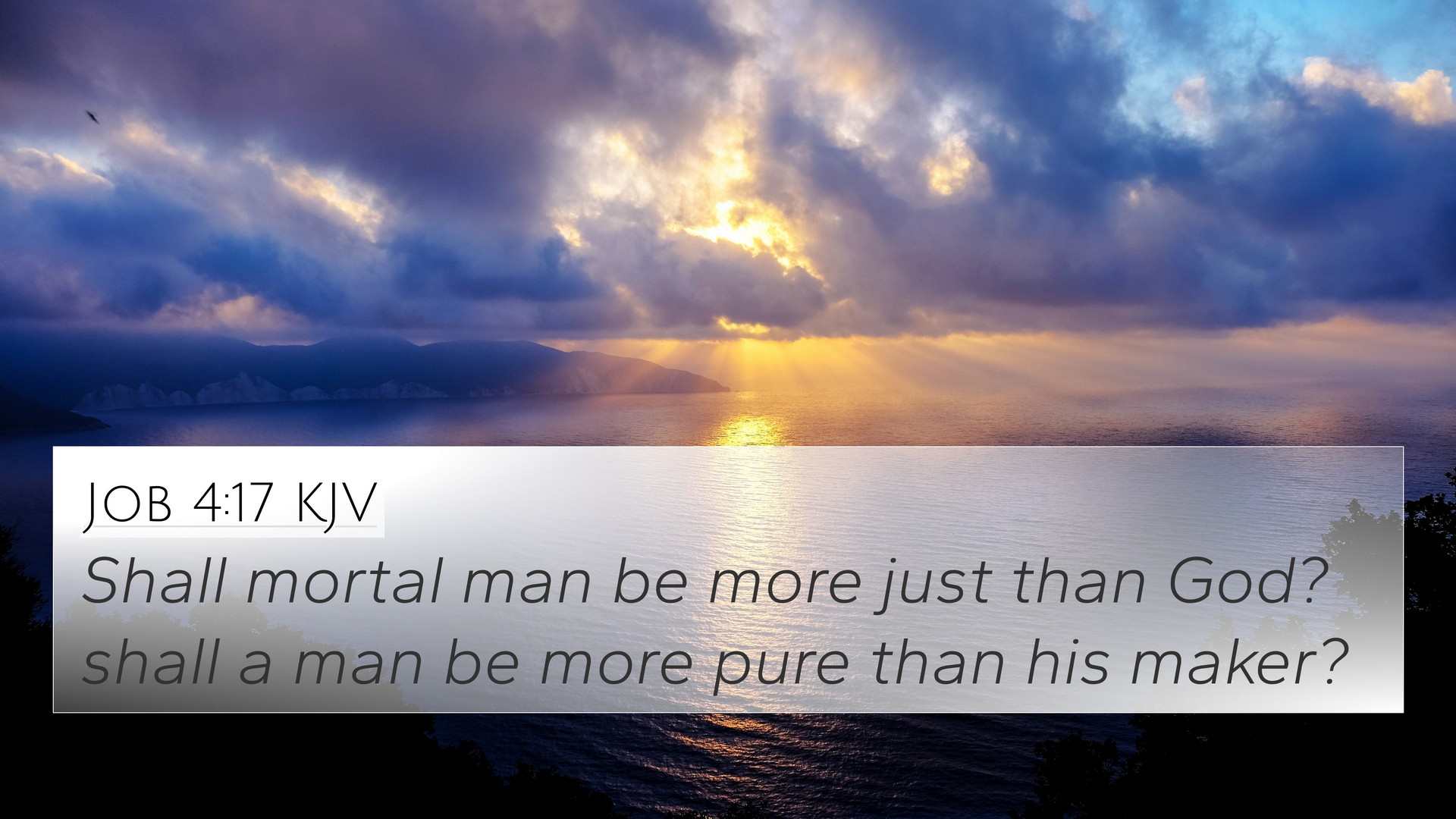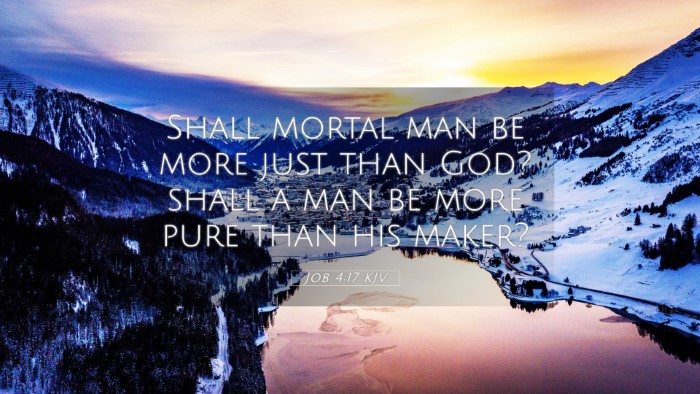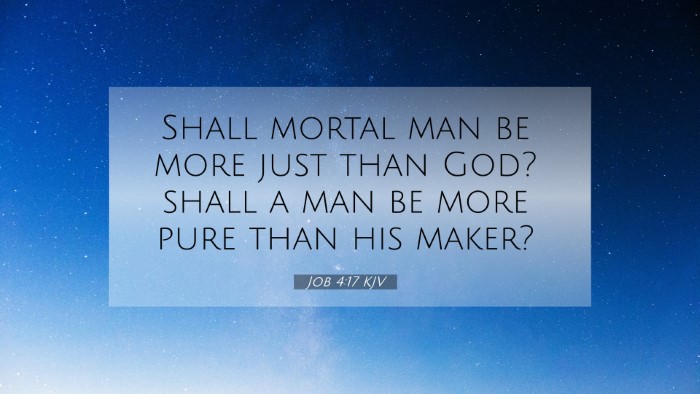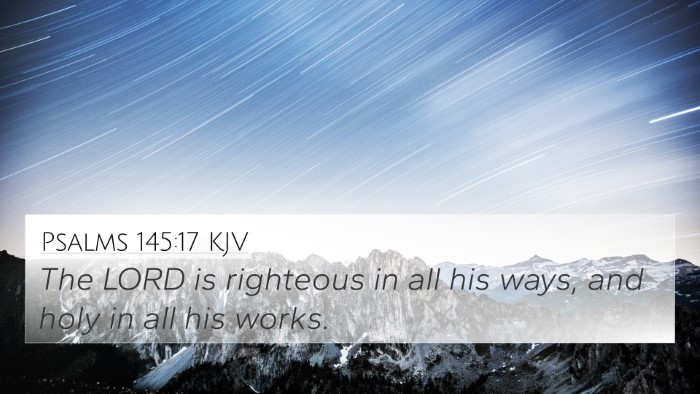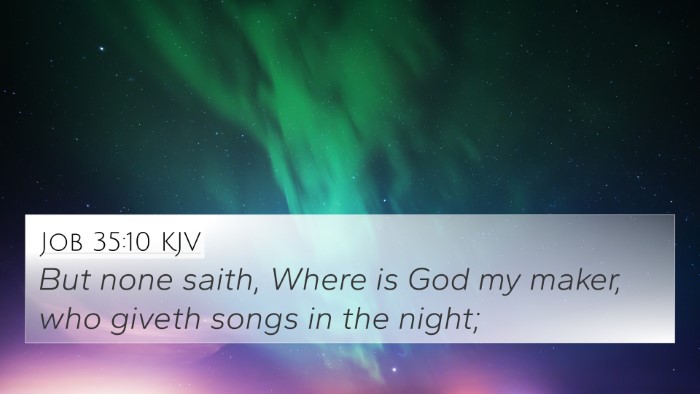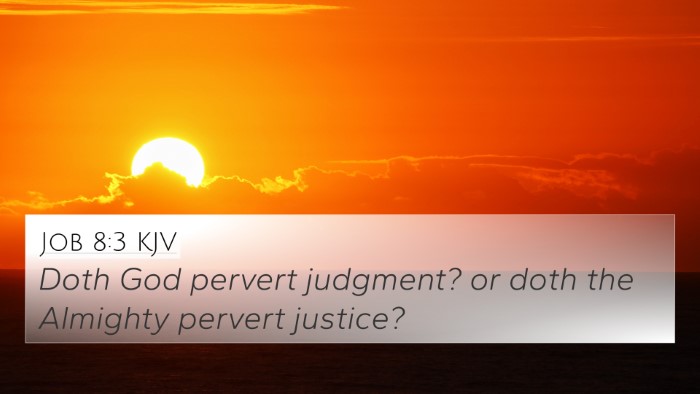Old Testament
Genesis Exodus Leviticus Numbers Deuteronomy Joshua Judges Ruth 1 Samuel 2 Samuel 1 Kings 2 Kings 1 Chronicles 2 Chronicles Ezra Nehemiah Esther Job Psalms Proverbs Ecclesiastes Song of Solomon Isaiah Jeremiah Lamentations Ezekiel Daniel Hosea Joel Amos Obadiah Jonah Micah Nahum Habakkuk Zephaniah Haggai Zechariah MalachiJob 4:17 Similar Verses
Job 4:17 Cross References
Shall mortal man be more just than God? shall a man be more pure than his maker?
Uncover the Rich Themes and Topics of This Bible Verse
Listed below are the Bible themes associated with Job 4:17. We invite you to explore each theme to gain deeper insights into the Scriptures.
Job 4:17 Cross Reference Verses
This section features a detailed cross-reference designed to enrich your understanding of the Scriptures. Below, you will find carefully selected verses that echo the themes and teachings related to Job 4:17 KJV. Click on any image to explore detailed analyses of related Bible verses and uncover deeper theological insights.
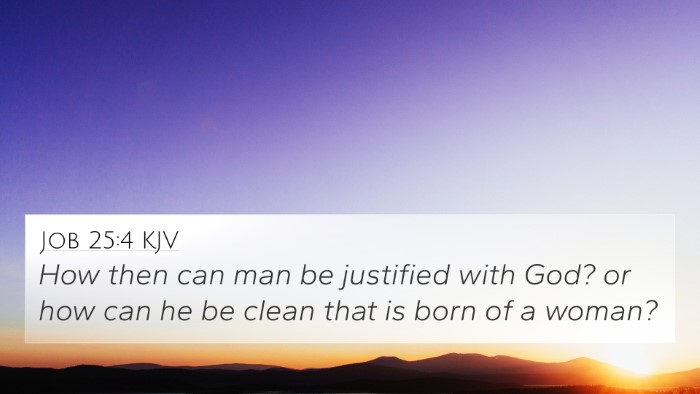
Job 25:4 (KJV) »
How then can man be justified with God? or how can he be clean that is born of a woman?
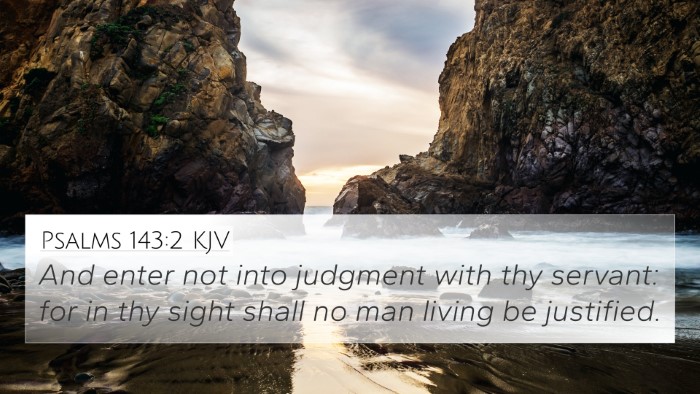
Psalms 143:2 (KJV) »
And enter not into judgment with thy servant: for in thy sight shall no man living be justified.
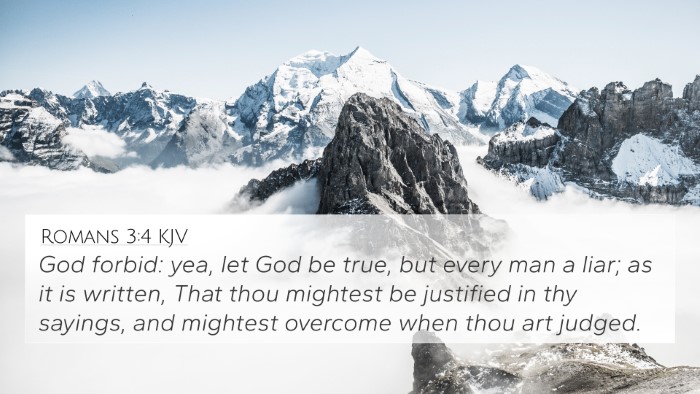
Romans 3:4 (KJV) »
God forbid: yea, let God be true, but every man a liar; as it is written, That thou mightest be justified in thy sayings, and mightest overcome when thou art judged.

Romans 11:33 (KJV) »
O the depth of the riches both of the wisdom and knowledge of God! how unsearchable are his judgments, and his ways past finding out!
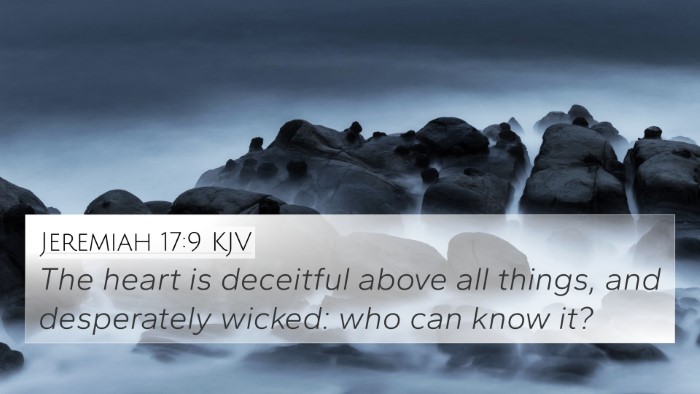
Jeremiah 17:9 (KJV) »
The heart is deceitful above all things, and desperately wicked: who can know it?
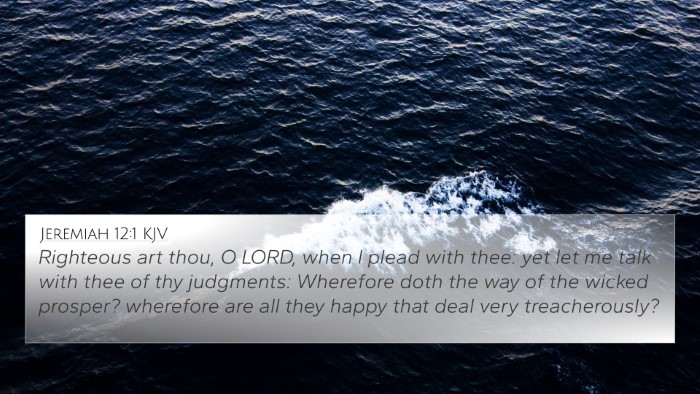
Jeremiah 12:1 (KJV) »
Righteous art thou, O LORD, when I plead with thee: yet let me talk with thee of thy judgments: Wherefore doth the way of the wicked prosper? wherefore are all they happy that deal very treacherously?
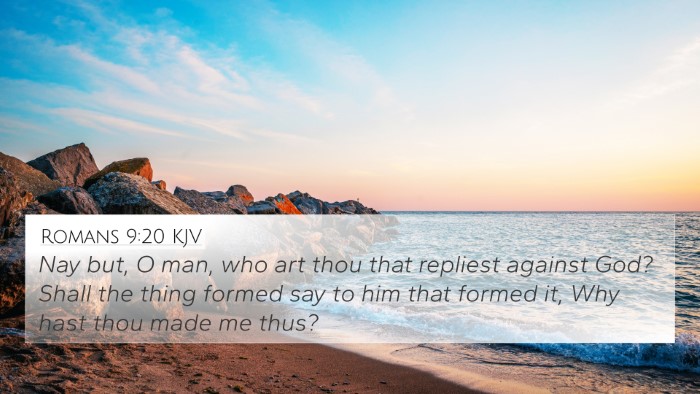
Romans 9:20 (KJV) »
Nay but, O man, who art thou that repliest against God? Shall the thing formed say to him that formed it, Why hast thou made me thus?
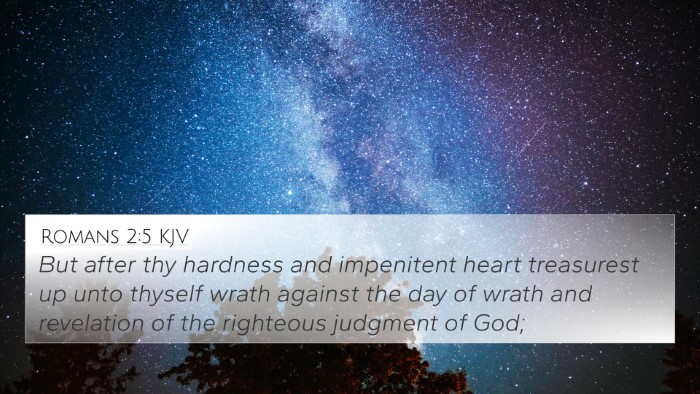
Romans 2:5 (KJV) »
But after thy hardness and impenitent heart treasurest up unto thyself wrath against the day of wrath and revelation of the righteous judgment of God;
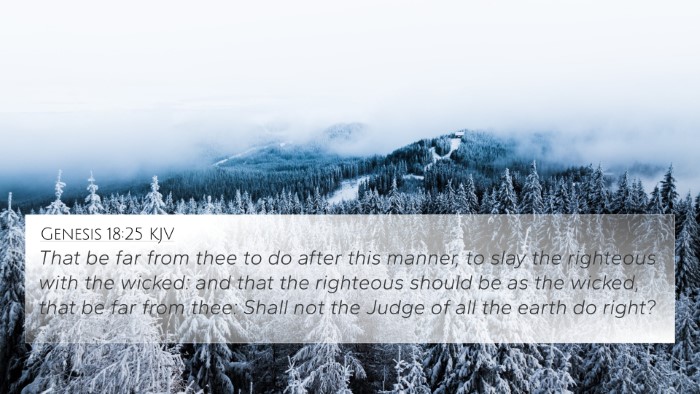
Genesis 18:25 (KJV) »
That be far from thee to do after this manner, to slay the righteous with the wicked: and that the righteous should be as the wicked, that be far from thee: Shall not the Judge of all the earth do right?

Job 40:8 (KJV) »
Wilt thou also disannul my judgment? wilt thou condemn me, that thou mayest be righteous?

Job 35:2 (KJV) »
Thinkest thou this to be right, that thou saidst, My righteousness is more than God's?

Job 15:14 (KJV) »
What is man, that he should be clean? and he which is born of a woman, that he should be righteous?
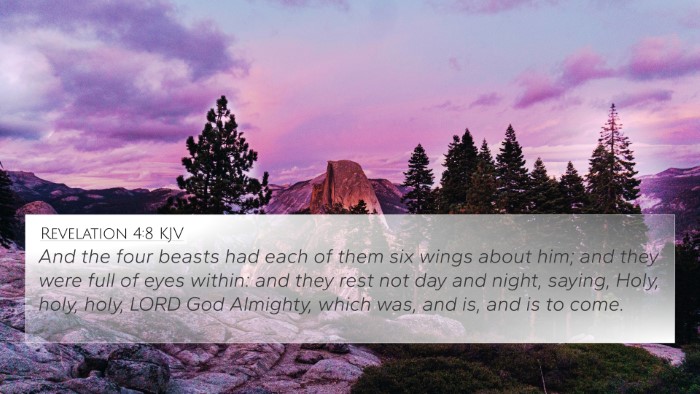
Revelation 4:8 (KJV) »
And the four beasts had each of them six wings about him; and they were full of eyes within: and they rest not day and night, saying, Holy, holy, holy, LORD God Almighty, which was, and is, and is to come.
Job 4:17 Verse Analysis and Similar Verses
Understanding Job 4:17
The verse Job 4:17 states: "Shall mortal man be more just than God? shall a man be more pure than his maker?" This verse is a poignant reminder of human limitations in contrast to the divine nature of God. Below, we explore the meaning of this verse as interpreted by notable public domain commentaries.
Interpretation Overview
This verse questions the possibility of a mortal being having more righteousness or purity than God himself. It reflects a theme present throughout the Bible regarding the innate lack of holiness in humanity compared to the perfection of God.
Matthew Henry's Commentary
According to Matthew Henry, this verse emphasizes God’s supreme justice and righteousness. He suggests that Job's friend, Eliphaz, is warning against the folly of human pride. The statement calls attention to the folly of presuming to judge God when He alone defines justice and righteousness. Henry contrasts the purity of God's nature with the susceptibility of man to sin, advocating for humility before the Creator.
Albert Barnes' Analysis
Albert Barnes elaborates that this verse asserts God's absolute rights over His creation. He contends that it is unreasonable for mankind, limited by sin and error, to attempt to measure their righteousness against that of the Almighty. Barnes highlights that this is part of the broader discourse within the Book of Job, which centers on human suffering and the divine perspective on justice.
Adam Clarke's Exegesis
Adam Clarke provides a detailed exegesis focusing on the reality of human inadequacy. He notes that the questions posed in this verse are rhetorical, underscoring that no human can elevate themselves to a status of purity above their Maker. Clarke’s interpretation revolves around the theme that wisdom and understanding are grounded in recognizing our position as flawed beings in need of God’s grace.
Thematic Connections
This verse and its commentary lead us to consider various thematic connections within Scripture regarding humanity’s relationship with God. Below are some significant parallels:
- Psalms 144:3-4: "LORD, what is man, that you take knowledge of him? or the son of man, that you make account of him? Man is like to vanity: his days are as a shadow that passes away." This passage echoes the idea of human frailty compared to divine omnipotence.
- Isaiah 55:9: "For as the heavens are higher than the earth, so are my ways higher than your ways, and my thoughts than your thoughts." This representation of God's ways highlights the disparity between human understanding and divine wisdom.
- Romans 3:23: "For all have sinned, and come short of the glory of God." This verse reinforces the notion of human inadequacy before God’s holiness.
- Job 9:2: "I know it is true, but how can mere mortals prove their innocence before God?" This reflects the struggle and question posed by Job about his own righteousness.
- Proverbs 21:30: "There is no wisdom, nor understanding, nor counsel against the LORD." This supports the idea that human wisdom cannot stand against divine judgment.
- 1 John 1:8: "If we say that we have no sin, we deceive ourselves, and the truth is not in us." This verse aligns with the theme of human sinfulness and need for repentance.
- Acts 17:24-25: "God, who made the world and everything in it...is not served by human hands, as if he needed anything." This asserts God’s self-sufficiency and humanity’s reliance on Him.
- Galatians 6:3: "For if a man think himself to be something, when he is nothing, he deceiveth himself." This reinforces the warning against human arrogance.
- Job 25:4-6: "How then can man be justified with God? or how can he be clean that is born of a woman?" This question parallels Job 4:17, probing the righteousness of humanity.
- Romans 11:33: "O the depth of the riches both of the wisdom and knowledge of God! How unsearchable are his judgments, and his ways past finding out!" This verse marvels at God's profound wisdom, contrasting it with human understanding.
Concluding Thoughts
Job 4:17 encapsulates a critical reflection on the nature of humanity in comparison to God’s perfection. The insights from Matthew Henry, Albert Barnes, and Adam Clarke contribute significantly to our understanding of this verse, leading us to acknowledge our need for humility and reliance on God's grace. Through the exploration of cross-references and comparative analysis of Bible verses, we gain a deeper appreciation for the intricate connections woven throughout Scripture, showcasing a consistent theme of divine justice over human fallibility.
Tools for Further Study
For those interested in engaging in cross-referencing Bible study, various tools can aid in deepening your understanding:
- Bible concordance: A tool that allows readers to find specific verses or words throughout the Bible.
- Bible reference resources: Guides that provide explanations of themes and connections between scriptures.
- Bible cross-reference guide: A structured approach to understanding related verses and concepts.
- Cross-referencing Bible study methods: Strategies for identifying and analyzing the relationships between biblical texts.
- How to find cross-references in the Bible: Learning to identify similarities and themes within scriptures.
